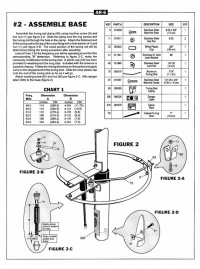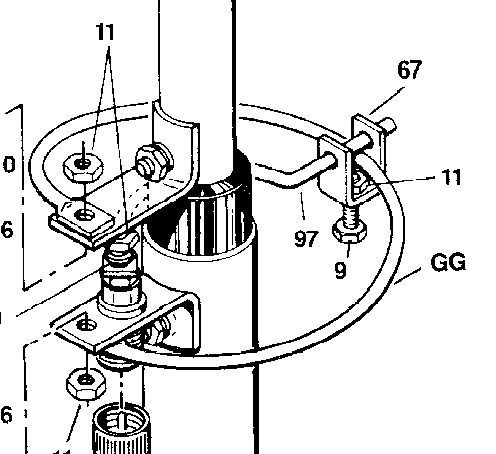Ringo Ranger: Difference between revisions
mNo edit summary |
mNo edit summary |
||
| (4 intermediate revisions by the same user not shown) | |||
| Line 1: | Line 1: | ||
Amateur radio antenna. | Amateur radio antenna. | ||
[[File:RingoRangerARX2B.png]] | |||
== 2-Meter Version == | == 2-Meter Version == | ||
| Line 7: | Line 9: | ||
# Ringo Ranger II (ARX-2B) - adds the radials approx. 5/8 wavelength below the ring adding the equivalent of an additional 5/8-wave radiator. | # Ringo Ranger II (ARX-2B) - adds the radials approx. 5/8 wavelength below the ring adding the equivalent of an additional 5/8-wave radiator. | ||
The ground plane kit on the ARX-2B includes 50" of coax to place between the antenna and the ground plane. So the ground plane attaches to the mast at that distance below the antenna. The ground plane is made up of a union to which | The ground plane kit on the ARX-2B includes 50" of coax to place between the antenna and the ground plane. So the ground plane attaches to the mast at that distance below the antenna. The ground plane is made up of a union to which three 20" long radials connect. The union is connected to the coax shield. Whether the ground plane kit serves as a 5/8 wave element or a decoupling section depends on who you ask. | ||
* Ground plane union and radials are 50" below antenna base on mast | |||
* Ground plane has (3) radials each being 20" in length | |||
If you look at the ARX-2B design (the current product which includes radials as part of the design) you'll see the coaxial feedline outer conductor is bonded to the radials and the supporting mast 1/2 wavelength below the feedpoint of the antenna. This makes the "antenna structure" quite a bit taller overall, but does a pretty good job of decoupling both the cable and the mast, and makes a more stable installation that can achieve the stated gain | If you look at the ARX-2B design (the current product which includes radials as part of the design) you'll see the coaxial feedline outer conductor is bonded to the radials and the supporting mast 1/2 wavelength below the feedpoint of the antenna. This makes the "antenna structure" quite a bit taller overall, but does a pretty good job of decoupling both the cable and the mast, and makes a more stable installation that can achieve the stated gain | ||
== Components == | |||
[[File:ARX-2Btuningring.png]] | |||
[[File:AR-6-41.jpg|thumb|none|200px]] | |||
== Reference == | == Reference == | ||
| Line 16: | Line 27: | ||
[[Category:Radio]] | [[Category:Radio]] | ||
[[Category:Tangible Product]] | [[Category:Tangible Product]] | ||
[[Category:Ham Radio]] | |||
Latest revision as of 16:11, 27 September 2018
Amateur radio antenna.
2-Meter Version
- Ringo (AR2) - the original version which looks like just the lower section of a Ringo Ranger, without the top or hairpin match.
- Ringo Ranger (ARX-2) -
- Ringo Ranger II (ARX-2B) - adds the radials approx. 5/8 wavelength below the ring adding the equivalent of an additional 5/8-wave radiator.
The ground plane kit on the ARX-2B includes 50" of coax to place between the antenna and the ground plane. So the ground plane attaches to the mast at that distance below the antenna. The ground plane is made up of a union to which three 20" long radials connect. The union is connected to the coax shield. Whether the ground plane kit serves as a 5/8 wave element or a decoupling section depends on who you ask.
- Ground plane union and radials are 50" below antenna base on mast
- Ground plane has (3) radials each being 20" in length
If you look at the ARX-2B design (the current product which includes radials as part of the design) you'll see the coaxial feedline outer conductor is bonded to the radials and the supporting mast 1/2 wavelength below the feedpoint of the antenna. This makes the "antenna structure" quite a bit taller overall, but does a pretty good job of decoupling both the cable and the mast, and makes a more stable installation that can achieve the stated gain
Components


